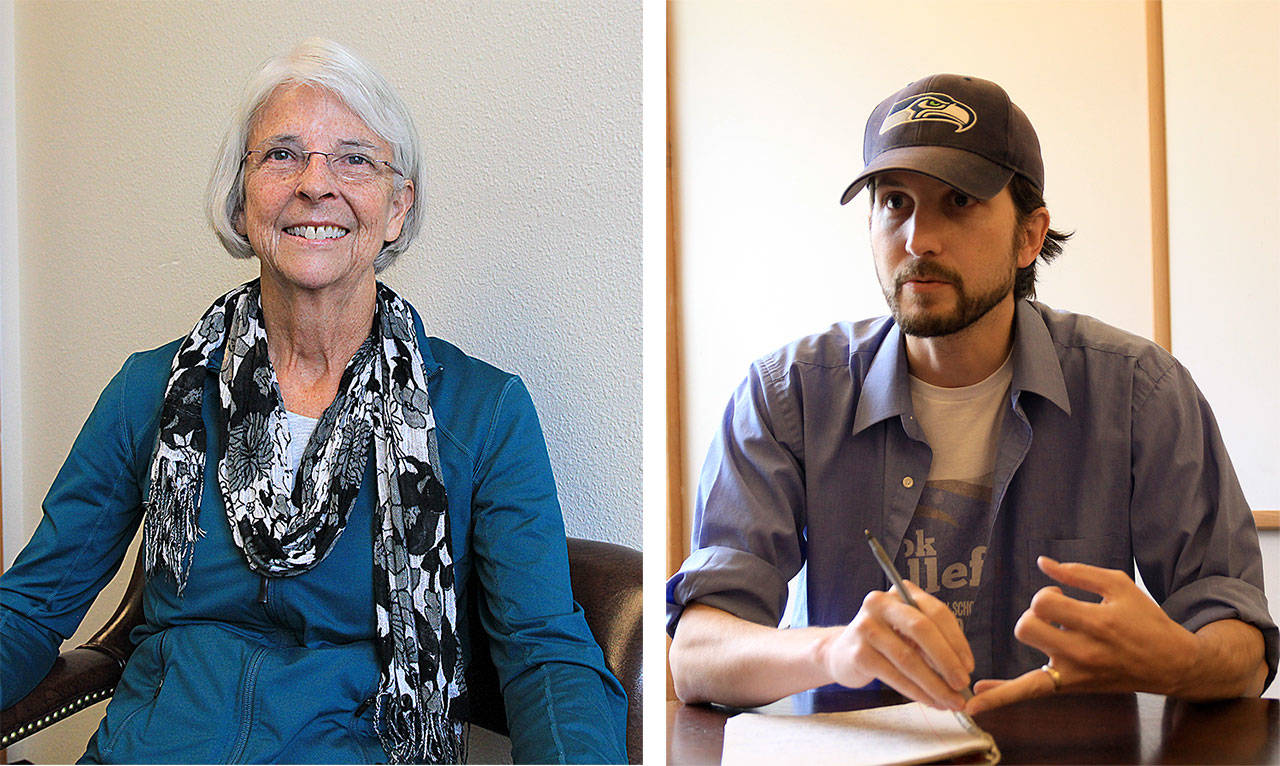Voters will choose between a realist and an idealist in the only contested race for the South Whidbey School Board.
Linda Racicot, a retired teacher, is the president of the school board and is seeking a third term. She said she’s proud of the quality of the education and the district’s accomplishments, which include impressive test scores, a program to help homeless students, a weekly period dedicated to teacher collaboration and the transformation of the middle school into a community hub.
“We are light years from where we were when I started teaching,” she said.
Brook Willeford, a graduate of South Whidbey High School, said he wants to help repair a rift he sees between the administration and the community, as well as between the administration and teachers. He feels bringing these groups together will help with declining enrollment — perhaps one of the district’s greatest challenges — by convincing families not to abandon the district.
“I will be a new voice that’s actually going to listen to what the community has to say,” he said.
Tensions between the school board and the community came to a head in April when parents and educators crowded into a school board forum to complain about a variety of topics.
Racicot said every person she talked to seemed to have a different problem. Many of the issues were based on misunderstandings, rumors or parents going to the wrong place to address concerns, she said; the overriding issue, however, was a failure in communication.
The district has responded to the complaints, she said, in a variety of ways. Officials are improving communication, for example, by bringing parents into advisory teams and revising the parent handbook.
“We’re trying to reach out and help parents understand how to communicate,” she said, adding that the board meetings are open to the public and board documents are available online, yet misinformation persists.
Willeford, however, said the board isn’t listening.
He agrees that communication is a problem, which he feels is linked to an insular school board that doesn’t seek information beyond the administration. He said he will listen to the community, but also be proactive in going to schools to talk to teachers and students; he wants to help build communities among students by encouraging participation in clubs and athletics.
Willeford said there was a strong tie between schools and the community when he was in school and the district was “beloved by all,” but that has changed.
“I want my daughter to be as proud of her South Whidbey education as I was,” he said, referring to his 3-year-old daughter.
Also, Willeford — who is married to a Coupeville teacher — said the relationship the administration and board has with teachers is simply not good. He points to a 2016 survey of the staff in which only 19 percent felt the collaboration between the district and schools is based on trust and respect.
He also points to the negotiations between the administration and the teachers last year after an infusion of funding statewide from the state Legislature in response to the McCleary decision. He said the administration took a hard line and a strike was narrowly avoided.
“They were treated like a line item in a budget,” he said of the teachers, “not as members of the community.”
Under the two-year agreement, minimum total pay was set at $50,827 in the first year and $53,639 in the second. Maximum total pay increased to $103,000 in year one and $108,000 in year two.
The salaries are now “within the realm of a fair wage,” he said.
Racicot agrees that negotiations are adversarial, which she feels is unnecessarily divisive and pits stakeholders against stakeholders. The solution, she said, is for the state to set salaries.
She said “the budget flows through” all of the board’s decisions, especially in a district challenged with declining enrollment. Teacher salaries are no different. People often don’t seem to understand budget constraints, she said, and the tough decisions that go with them.
Nearly 87 percent of the budget goes to salaries, she said. The money from the state won’t last, she said; the district could barely afford the salary increases in the first year of the contract and “adjustments” will have to be made in future years as salaries continue to climb and the state money wanes.
The salary hikes, she said, have “turned into a disaster.”
Even so, Racicot and the other members of the board bumped up the salaries of the top three school administrators by 15 percent. Superintendent Jo Moccia’s base salary is now $193,000. Board members said it is comparable to other districts.
Yet Willeford said the board was tone deaf in handing out the administrative raises.
“The superintendent shouldn’t make more than the governor,” he said.
The governor of Washington state currently earns $172,000 a year.
Racicot worked in education for 35 years on South Whidbey, much of that time as a teacher at the middle school. Willeford was one of her students. She ran for the school board after retiring.
Willeford grew up on South Whidbey, worked making video and board games after college and then returned to Whidbey. He’s currently a stay-at-home dad and co-manages the Clyde Theater.



